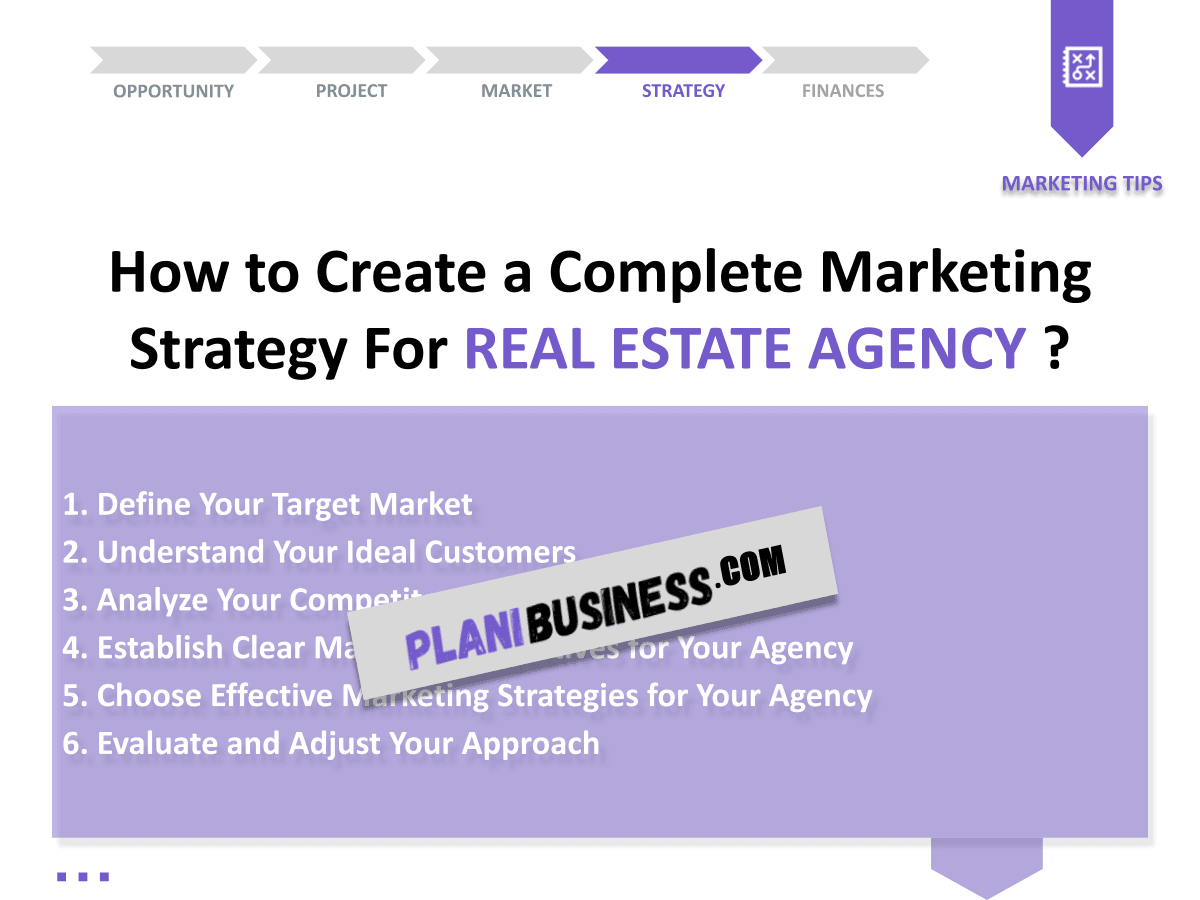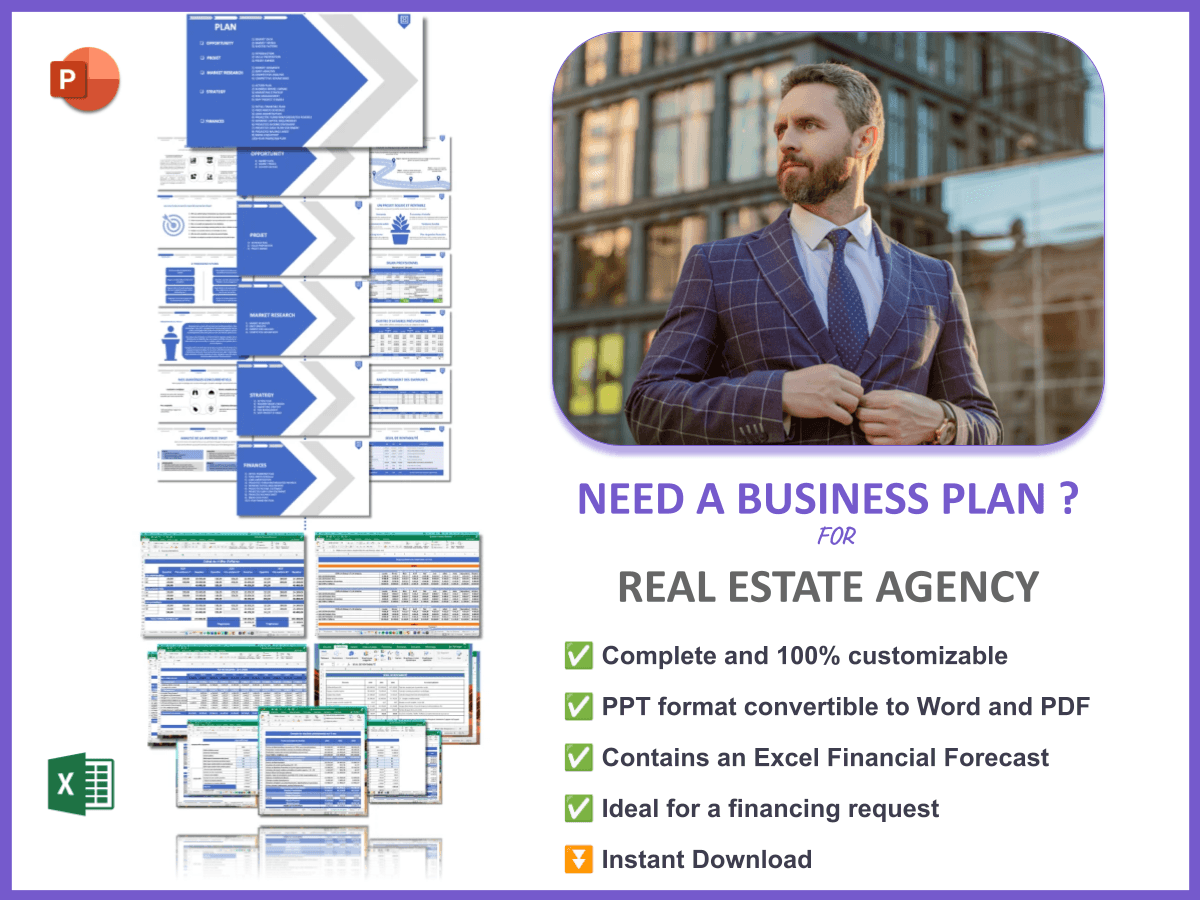Are you thinking about starting a Real Estate Agency Marketing Plan? You’re not alone! Many aspiring real estate agents struggle to find effective marketing strategies that truly resonate with their target audience. In fact, about 90% of new real estate agencies fail to establish a strong market presence within their first year. A well-crafted marketing plan can be the difference between success and failure.
A Real Estate Agency Marketing Plan is a strategic document that outlines how you will attract and retain clients in the competitive real estate market. It encompasses everything from identifying your target audience to choosing marketing strategies that align with your business goals.
1. Define Your Target Market
| Aspect | Description |
|---|---|
| Demographics | Age, gender, income level, etc. |
| Geographic Location | Specific areas you want to target |
| Psychographics | Interests, values, lifestyle choices |
Understanding your target market is crucial for a successful Real Estate Agency Marketing Plan. It involves breaking down the demographics, geographic locations, and psychographics of your potential clients. For example, if you are targeting first-time homebuyers, you might focus on younger demographics with lower income levels, often seeking affordable housing options.
To get started, consider conducting surveys or using online tools to gather data about your potential clients. You can also analyze market trends and local statistics to get a clearer picture of who your ideal customers are. Remember, the more specific you can be about your target market, the better your marketing efforts will be.
2. Understand Your Ideal Customers
| Customer Type | Characteristics |
|---|---|
| First-time Homebuyers | Young professionals looking for affordable homes |
| Luxury Home Buyers | Affluent individuals seeking high-end properties |
| Investors | People looking for rental properties or flips |
To create an effective marketing plan, you need to understand who your ideal customers are. This includes their needs, motivations, and pain points. For instance, first-time homebuyers might be concerned about financing options, while luxury home buyers may prioritize property features and exclusivity.
Engaging with your audience through social media, surveys, and direct interactions can provide valuable insights into what drives their decisions. Knowing your ideal customers inside and out will enable you to tailor your messaging and marketing strategies effectively, ensuring that you meet their needs and stand out in the competitive market.
3. Analyze Your Competitors
| Competitor | Strengths | Weaknesses |
|---|---|---|
| Competitor A | Strong online presence | Poor customer service |
| Competitor B | Established brand | High fees |
Analyzing your competitors is a vital step in developing a successful Real Estate Agency Marketing Plan. By understanding what your competitors do well and where they struggle, you can find opportunities to differentiate your agency. This involves looking at their marketing strategies, customer service practices, and overall reputation in the market.
Start by identifying your main competitors in the area. Look at their websites, social media presence, and customer reviews. What marketing tactics are they using? Are they focusing on social media, email marketing, or traditional advertising? By answering these questions, you can pinpoint gaps in their strategies that your agency can fill.
For instance, if a competitor has a strong online presence but receives negative feedback for customer service, you can emphasize exceptional client support in your marketing. This not only helps you stand out but also builds trust with potential clients.
4. Establish Clear Marketing Objectives for Your Agency
| Objective | Measurement |
|---|---|
| Increase brand awareness | Social media followers, website traffic |
| Generate leads | Number of inquiries or sign-ups |
Setting clear marketing objectives is essential for tracking your progress in your Real Estate Agency Marketing Plan. Your objectives should be specific, measurable, achievable, relevant, and time-bound (SMART). For example, instead of saying “I want to increase sales,” you might say, “I want to generate 50 new leads within the next three months.”
Having well-defined objectives allows you to focus your efforts and measure success accurately. You can use various metrics to track your progress, such as website traffic, social media engagement, and the number of inquiries generated. Regularly reviewing these metrics will help you adjust your strategies as needed to ensure you stay on track to meet your goals.
Moreover, consider setting both short-term and long-term objectives. Short-term goals can provide quick wins and motivation, while long-term goals keep you focused on your overall vision for the agency.
5. Choose Effective Marketing Strategies for Your Agency
| Strategy | Description |
|---|---|
| Social Media Marketing | Engaging content on platforms like Instagram and Facebook |
| Email Campaigns | Targeted emails to nurture leads |
| Content Marketing | Blog posts and resources that provide value |
Choosing effective marketing strategies is a crucial element of your Real Estate Agency Marketing Plan. The strategies you select should align with your target audience and marketing objectives. Here are some popular strategies to consider:
- Social Media Marketing: Leverage platforms like Instagram and Facebook to showcase listings, share client testimonials, and engage with your audience. Visual content is especially effective in real estate.
- Email Campaigns: Create targeted email campaigns that provide valuable information, updates on new listings, and personalized messages to nurture leads.
- Content Marketing: Start a blog where you can share tips, market trends, and local area insights. This not only establishes your authority but also helps with SEO, driving organic traffic to your website.
Make sure to evaluate the effectiveness of each strategy regularly. You can track engagement rates, lead generation, and conversion metrics to determine what works best for your agency. Combining multiple strategies can often yield the best results, as they complement each other and broaden your reach.
6. Evaluate and Adjust Your Approach
| Metric | Action |
|---|---|
| Lead Conversion Rate | Adjust your sales tactics if low |
| Website Traffic | Optimize your SEO strategies if necessary |
| Social Media Engagement | Change content strategy based on audience preferences |
Regularly evaluating your marketing efforts is essential for the success of your Real Estate Agency Marketing Plan. By analyzing key metrics, you can identify what’s working and what needs improvement. For instance, if your lead conversion rate is low, it may be time to adjust your sales tactics or refine your messaging.
Consider implementing a structured review process, where you assess your strategies on a monthly or quarterly basis. Look at metrics such as website traffic, social media engagement, and conversion rates. If you notice certain strategies are underperforming, don’t hesitate to pivot and try new approaches.
Additionally, gathering feedback from clients can provide valuable insights. Understanding their experience and preferences will allow you to tailor your services and marketing efforts more effectively. Remember, the real estate market is dynamic, and staying adaptable is key to long-term success.
7. Example N°1 of Marketing Plan for First-time Homebuyers
| Steps | Actions | Details |
|---|---|---|
| 1 | Target Market | Young professionals in urban areas |
| 2 | Ideal Customers | First-time buyers seeking affordable housing |
| 3 | Competitors | Analyze local agencies catering to this demographic |
| 4 | Marketing Objectives | Generate 50 leads within 3 months |
| 5 | Marketing Strategies | Social media ads targeting young professionals |
| 6 | Evaluation | Monitor lead conversion weekly |
This marketing plan targets first-time homebuyers, focusing on young professionals living in urban areas. The goal is to generate 50 leads within three months through tailored social media ads that highlight affordable housing options.
To evaluate the effectiveness of this plan, the agency will monitor lead conversions weekly and adjust the marketing strategies as needed. This proactive approach ensures that the agency stays relevant and meets the needs of its target audience.
8. Example N°2 of Marketing Plan for Luxury Home Buyers
| Steps | Actions | Details |
|---|---|---|
| 1 | Target Market | Affluent individuals looking for luxury homes |
| 2 | Ideal Customers | High-net-worth clients |
| 3 | Competitors | Luxury real estate firms in the area |
| 4 | Marketing Objectives | Sell 5 properties in 6 months |
| 5 | Marketing Strategies | High-end virtual tours and exclusive events |
| 6 | Evaluation | Assess client feedback and adjust strategies |
This marketing plan is designed for luxury home buyers, targeting affluent individuals seeking high-end properties. The objective is to sell five properties within six months by offering high-end virtual tours and hosting exclusive events to attract potential buyers.
To ensure the effectiveness of this plan, the agency will assess client feedback regularly and make adjustments to its strategies as necessary. This focus on client satisfaction is essential for building a strong reputation in the luxury market.
9. Example N°3 of Marketing Plan for Real Estate Investors
| Steps | Actions | Details |
|---|---|---|
| 1 | Target Market | Individuals and companies looking for investment opportunities |
| 2 | Ideal Customers | Real estate investors focused on rental properties |
| 3 | Competitors | Other agencies specializing in investment properties |
| 4 | Marketing Objectives | Generate 30 leads in 4 months |
| 5 | Marketing Strategies | Webinars and educational content on investing |
| 6 | Evaluation | Track lead generation through analytics |
This marketing plan focuses on real estate investors, specifically targeting individuals and companies seeking investment opportunities in rental properties. The goal is to generate 30 leads within four months by offering webinars and educational content that provides valuable insights into the investing process.
To evaluate the success of this plan, the agency will track lead generation through analytics tools. This data-driven approach will help refine the marketing strategies and ensure they resonate with the target audience.
10. Example N°4 of Marketing Plan for Relocation Services
| Steps | Actions | Details |
|---|---|---|
| 1 | Target Market | Families moving to new cities |
| 2 | Ideal Customers | Individuals seeking comprehensive relocation services |
| 3 | Competitors | Other agencies offering relocation packages |
| 4 | Marketing Objectives | Help 10 families relocate in 6 months |
| 5 | Marketing Strategies | Partnerships with moving companies |
| 6 | Evaluation | Client satisfaction surveys post-relocation |
This marketing plan is tailored for relocation services, targeting families who are moving to new cities. The objective is to assist 10 families in their relocation within six months, utilizing partnerships with moving companies to streamline the process.
To measure the effectiveness of this plan, the agency will conduct client satisfaction surveys after the relocation process. This feedback will be invaluable in refining services and enhancing the overall customer experience.
11. Example N°5 of Marketing Plan for Real Estate Agents
| Steps | Actions | Details |
|---|---|---|
| 1 | Target Market | New agents entering the market |
| 2 | Ideal Customers | Individuals seeking mentorship and training |
| 3 | Competitors | Established agencies with training programs |
| 4 | Marketing Objectives | Recruit 15 new agents in a year |
| 5 | Marketing Strategies | Workshops and free training sessions |
| 6 | Evaluation | Monitor recruitment numbers monthly |
This marketing plan is designed for real estate agents, focusing on new agents entering the market. The goal is to recruit 15 new agents within a year by offering workshops and free training sessions that provide valuable insights into the industry.
To evaluate the success of this plan, the agency will monitor recruitment numbers monthly. This will help determine which strategies are most effective in attracting new talent and where improvements can be made.
12. Example N°6 of Marketing Plan for Commercial Properties
| Steps | Actions | Details |
|---|---|---|
| 1 | Target Market | Business owners looking for commercial space |
| 2 | Ideal Customers | Entrepreneurs and small businesses |
| 3 | Competitors | Other agencies focusing on commercial real estate |
| 4 | Marketing Objectives | Close 5 commercial leases in 3 months |
| 5 | Marketing Strategies | Networking events and business expos |
| 6 | Evaluation | Client feedback and lease signing rates |
This marketing plan targets commercial properties, focusing on business owners seeking commercial space. The objective is to close five commercial leases within three months through networking events and participation in business expos.
To evaluate this plan’s effectiveness, the agency will gather client feedback and track lease signing rates. This information will help refine marketing efforts and ensure that they align with the needs of the target market.
13. Example N°7 of Marketing Plan for Open Houses
| Steps | Actions | Details |
|---|---|---|
| 1 | Target Market | Potential homebuyers interested in specific properties |
| 2 | Ideal Customers | Individuals actively searching for homes |
| 3 | Competitors | Other agents hosting similar events |
| 4 | Marketing Objectives | Attract 20 visitors per open house |
| 5 | Marketing Strategies | Promote through social media and local listings |
| 6 | Evaluation | Visitor feedback and follow-up inquiries |
This marketing plan is crafted for open houses, targeting potential homebuyers interested in specific properties. The goal is to attract 20 visitors per open house through effective promotion on social media and local listings.
To measure the success of this plan, the agency will collect visitor feedback and track follow-up inquiries. This will provide insights into how well the open houses are meeting the needs of potential buyers and where improvements can be made.
Conclusion
In conclusion, developing a solid Real Estate Agency Marketing Plan is essential for standing out in the competitive real estate market. By understanding your target market, setting clear objectives, and choosing effective marketing strategies, you can attract and retain clients successfully. Regular evaluation of your strategies will help you adapt and thrive in this ever-changing landscape.
For a more comprehensive approach, consider creating a detailed business plan. You can check out this business plan template for a Real Estate Agency that provides valuable insights and structure for your agency’s growth.
If you’re looking to expand your knowledge further, don’t miss our articles on How to Set Up a Real Estate Agency? and How to Create a SWOT Analysis for Real Estate Agency. These resources will equip you with the tools you need to succeed in the real estate industry.
FAQ
- What is a real estate agency marketing plan?
A real estate agency marketing plan is a strategic document outlining how an agency will attract and retain clients, including target markets, marketing objectives, and strategies.
- Why is a marketing plan important for a real estate agency?
A marketing plan is crucial because it helps the agency focus its efforts, track progress, and adjust strategies to meet the needs of clients effectively.
- What are the key components of a real estate marketing plan?
Key components include defining the target market, understanding ideal customers, analyzing competitors, setting marketing objectives, and choosing effective marketing strategies.
- How can I identify my target market?
You can identify your target market by analyzing demographics, geographic locations, and psychographics, as well as conducting surveys and using market data.
- What marketing strategies are effective for real estate agencies?
Effective strategies include social media marketing, email campaigns, content marketing, and partnerships with local businesses.
- How often should I evaluate my marketing plan?
It’s recommended to evaluate your marketing plan regularly, such as monthly or quarterly, to assess performance and make necessary adjustments.
- What metrics should I track in my marketing plan?
Important metrics to track include lead generation, conversion rates, website traffic, and social media engagement.
- How can I generate leads for my real estate agency?
Lead generation can be achieved through targeted advertising, social media engagement, networking events, and offering valuable content to potential clients.
- What should I include in my marketing objectives?
Your marketing objectives should be SMART: Specific, Measurable, Achievable, Relevant, and Time-bound, tailored to your agency’s goals.
- How can I differentiate my agency from competitors?
You can differentiate your agency by emphasizing unique services, exceptional customer service, and leveraging personal branding to connect with clients.







